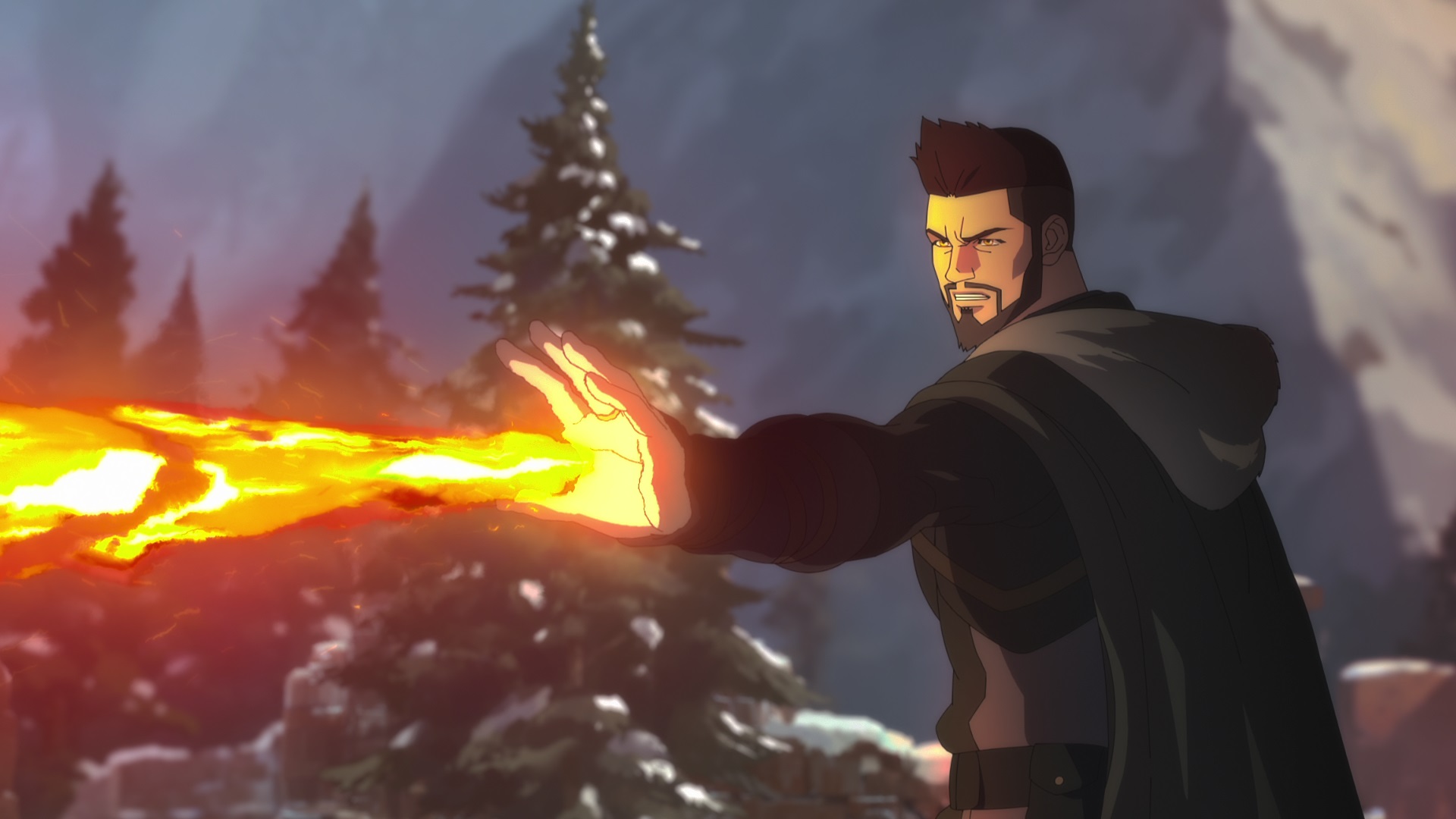What to Watch Verdict
'The Witcher: Nightmare of the Wolf' is a colorful and exciting side quest fans and casual viewers will definitely want to accept.
Pros
- +
🐺 Easy to follow storyline.
- +
🐺 Insanely good visuals.
- +
🐺 Solid world building.
Cons
- -
🐺 Slightly too slow-burning mystery.
- -
🐺 Pace-changing flashbacks.
- -
🐺 Underdeveloped Elven backstory.
This post contains mild spoilers for The Witcher: Nightmare of the Wolf
In advance of the second season of The Witcher, Netflix serves up an animated spin-off set before the fall of Kaer Morhen, the mountain stronghold of the Witchers’ Guild. But The Witcher: Nightmare of the Wolf isn’t your typical prequel. This fantasy drama sends an early signal that this installment isn’t interested in fitting season one into a more recognizable (linear) framework by centering Vesemir, a previously unknown character from The Witcher-verse.
Beau DeMayo’s script uses the now familiar monster-of-the-week narrative device to dive into centuries old events on the Continent, further deepening the history and scope of this fantasy world. If you thought Henry Cavill’s Geralt - and that season one prophecy - were the only characters or events of note; rest assured The Witcher-verse has an embarrassment of riches just waiting to be mined. Think of The Witcher: Nightmare of the Wolf as a novella.
This a slim story arc revolves around Vesemir (Theo James), a roguish witcher with a taste for the high life and little interest in selflessness. Following his journey offers insight into the varied dangers lurking on the Continent, as well as details on the different factions in the kingdom. There are slow-burning resentments aplenty and pettiness abounds. But have no fear, under Kwang Il Han's direction, this is one adventurous side quest viewers will definitely want to accept. Because Vesemir is a very talented witcher which means things absolutely get bloody.
Set in the kingdom of Kaedwen, Vesemir plies his trade with flare, witty quips, and recklessness matched only by his mastery of swordplay and magespells. With Theo James (Castlevania) bringing Vesemir to life with warmth, edge, and just the right amount of disdain this witcher makes for a most excellent anti-hero. There are witchers aplenty in this day and age and no two are the same.
From the outset, Han drops the audience directly into the mix. Vesemir, ever the opportunist, jumps into the fray to defeat a monster lurking in the forest attacking travelers. It’s an exhilarating and action-fueled opening. It's also a fantastic introduction to the sophisticated anime-influenced style that Studio MIR’s swiftly becoming known for (Dota: Dragon's Blood, Legend of Korra, The Boondocks). There’s beauty and depth to the imagery that when coupled with the twists and tragically romantic turns in the storyline builds into a bold hyper-realistic drama.
After a snark-ladened battle, Vesemir riffles through the pockets of the dead gathering his fee. Lucky for him, these were gentry and his take sees him soon soaking in a hot bath, eating and drinking well. Too bad for the surviving son, Vesemir has little interest in saving the recently orphaned. Although it must be said, he got more than a touch of assholishness blended in with the charisma. Making his chapter a great way to showcase why that resentment against witchers in Geralt's time is a) not entirely unfounded but b) still deeply rooted prejudice and political gamesmanship. Thankfully, as with all good anti-heroes, there’s more to Vesemir than meets the eye.
The latest updates, reviews and unmissable series to watch and more!
Young Vesemir’s (David Errigo Jr.) sly, witty, and hungry to escape the limited life of a bond servant. As he and his closest friend pull off a caper in the market, it’s not hard to see why as an adult, a previously impoverished child would a) be a boozing hedonist and b) tell a recently orphaned rich kid to essentially suck it up and deal.
Although it’s slightly jarring when the narrative pace slows for this extended flashback to Vesemir's childhood ; don’t worry the plot isn’t deconstructed like the live-action series. The point of this time-slip is immediately apparent. A chance encounter between a unscrupulous witcher named Deglan (Graham McTavish) and young Vesemir changes the course of his entire life. It’s a dangerous profession. Not for the meek or mild; definitely the kind of the unwanted and forgotten easily find themselves sacrificed to fill the ranks. Unlike most recruits, however, Vesemir volunteers to undergo the trials and transformation into a witcher. It's also where you'll find yourself wanting to smack him up side the head for not asking nearly enough questions about the people he's thrown his lot in with. The first of many times.
While Vesemire’s focused on securing his next bag, there's a battle waging at court over the continued relevance and role of witchers. More than a few witchers' ply their trade in disreputable ways as monsters become less plentiful to battle. It adds
layer of bitterness to the fear fermenting among the populace. Some, like a certain sorceress (Lara Pulver) with the King’s ear, lobby fiercely for the destruction of their stronghold Kaer Morhen and eradication of witchers for all time. Tasked with uncovering the origins of a monster, in order to save witchers from a death decree, Vesimer sets off to prove that despite their reputation, witchers weren’t responsible for resent attacks.
There’s a commentary on class and hierarchy built into any fantasy world with a feudal system. Thankfully Han lets the overtones (and drags) seamlessly blended into this storyline do all the heavy lifting. Juxtaposing young Vesemir’s choices to the cynical adult he becomes against what drives him to undertake a quest on behalf of a certain lady (Mary McDonnell) speaks volumes about what it takes to survive in this world. He may be a scoundrel but Vesemir's got a code.
So when he comes face-to-face with not only the consequences of his disinterest it leads to a reckoning and a third act that so fully capitalizes on the flexibility of animation its bring this story to an epic climax. Every emotional bet gets a payoff in the midst of the betrayal, fierce action sequences and magical battles. And while this chapter comes to a somewhat sad if satisfying end. Han’s craftily left the door open for returning the dangerous Vesemir. It’s a rather brilliant way to world-build and create connections without promising the undeliverable.
The Witcher: Nightmare of the Wolf is a striking 81 minute character study wrapped in mayhem and magic. Like all good animated stories, it uses bright colors, fluid movement and excellent scoring to showcase its worldbuilding and a cast of characters with quirks and unexpected complexity. It's sure to keep viewers on their toes. So, while fans will still have to wait until that December 17 premiere of The Witcher’s second eight episode season to learn more about the series’ primary storyline, the ripple effects from what befalls Vesemir continue straight through to present day and Geralt, stoic monster-hunter-for-hire.
The Witcher: Nightmare of the Wolf debuted on Netflix, August 23, 2021.
Ro is a Rotten Tomatoes approved film/tv critic, writer and host on several of the MTR Network's podcasts. She's a member of the San Diego Film Critics Society and the Online Association of Female Film Critics. She's a former culture columnist for San Diego CityBeat (may it rest in peace) with a serious addiction to genre fiction, horror and documentaries. You can find her sharing movie and book recs and random thoughts, on her podcast I Talk Sh!t and Read or in her newsletter, Shelf Envy.


